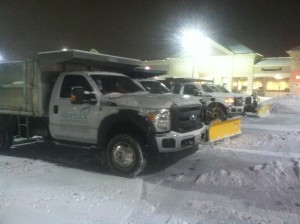Blizzard Jonah dumps record snowfall on our area.
That was a heck of a lot of snow last week. Now that we have shoveled our way out and the kids are getting back to school, the one remaining question is; will all this snow damage our landscapes?
A Blanket Of Snow
We have all heard this term used to describe how beautiful a thick layer of snow can look on the ground but it can be even more literal than that. Snow does have an insulating quality to it that can protect roots and plants from damaging cold temperatures and harsh wind. So, in many ways, a blanket of snow is truly protecting our valuable landscape plants.
Unfortunately, as much snow as we had can also damage some plants. Snow is heavy and when it sits on top of shrubs such as Boxwoods, Nandinas, Arborvitae and others, it can cause the limbs to get bent out of shape or even snap. Some of these plants will bounce right back with a little time while others may need to be wired together or even replaced.
Lots of Melting Going On
As the snow melts, it is providing valuable water that, although the plants cannot use it at this time due to their dormancy, does seep into the ground and fills the aquifers. This water may play an important role later in the year as things dry up. At the very least, the plants are not drying out as can sometimes happen in the winter.
Of course, too much water is not a good thing either. As the snow melts, keep an eye on the foundation of our home. We had so much snow that as it melts off there may be too much water for the ground to soak up. As a result, some of it may seep into your basement.
Snow and Your Lawn
One problem we will need to keep an eye out for this winter is Snow Mold (yes it is a real thing!). Snow Mold occurs when snow covers the lawn for an extended period and does not allow sunlight to reach the grass. It is a fungal disease that can have a devastating effect on our lawns. Look for roughly circular patches of bleached out areas in your lawn. This disease can be cured with a fungicide application.
Preventative Measures
Unfortunately at this point, what’s done is done. What you can do in the future to give your plants the best fighting chance to survive cold winters and heavy snows is to make your landscape plants as strong as possible. Allentuck Landscaping Co. has several fantastic maintenance programs to fit your needs and to help your lawn and landscape thrive all year long.
Remember, Allentuck Landscaping Co. is always here to help you design, install, construct and maintain you lawn and landscape. Now is the time to get your 2016 Lawn and Landscape Maintenance Quote. Give us a call!
Allentuck Landscaping Co. is Your Residential Landscape Company
Phone: 301-5-515-1900
Email: info@allentucklandscaping.com
Proudly serving Chevy Chase, Bethesda, Potomac, Darnestown, North Potomac, Rockville, Gaithersburg, Boyds, Germantown, Clarksburg, Ijamsville and Urbana.

